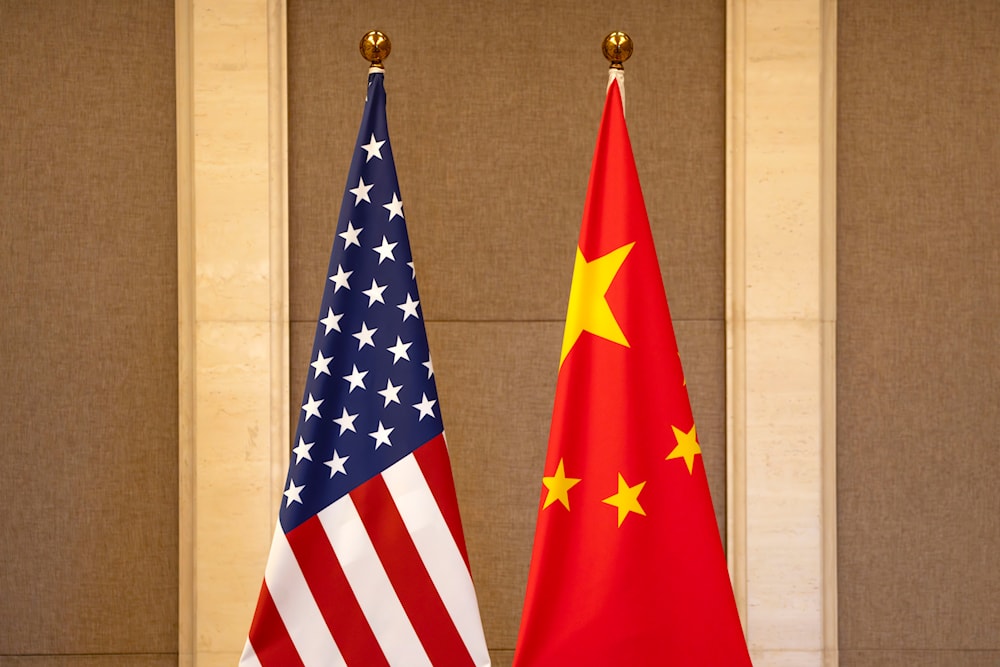China calls US 'biggest nuclear threat to the world'
The Chinese Defense spokesperson reveals that the US has the biggest nuclear arsenal in the world and follows policies that encourage its use.
-

US and Chinese flags are set up at the Diaoyutai State Guesthouse in Beijing, on July 8, 2023. (AP)
America is the country that poses a threat to the globe in the event of a nuclear war, China's Defense Ministry spokesperson Zhang Xiaogang told reporters on Friday. Beijing has accused Washington of making “irresponsible decisions” in attempts to maintain its hegemony, including by intimidating the international community with its nuclear arsenal.
Washington and Tokyo played the “China military threat” card to justify their move, according to Zhang Xiaogang, who stressed that such actions only “provoke bloc confrontation and undermine regional peace and stability."
With the "largest nuclear arsenal in the world" and a strategy that permits the first use of nuclear weapons, the US "poses the biggest nuclear threat to the world," the spokesman for the Chinese Defense Ministry relayed.
According to the Pentagon, one of the subjects covered at the "extended deterrence meeting" was "China's expansion of its nuclear arsenal."
North Korea, Iran, China, and Russia are included as four possible opponents for nuclear weapons planning in the most recent US National Defense Strategy (NDS), which was released by the Pentagon in 2022 along with the Nuclear Posture Review and Missile Defense Review. Furthermore, by permitting the employment of such weapons to thwart a conventional attack, it opens the door to a nuclear first strike.
Read next: US 15 years behind China in nuclear power development: Report
The US and Moscow signed the Intermediate-Range Nuclear Forces (INF) Treaty, which prohibited both countries from creating and deploying specific kinds of ground-based nuclear-capable missiles. In 2018, the US announced its withdrawal from the treaty. Washington claimed at the time that it needed these kinds of weapons, in part because China was not subject to the bilateral INF pact.
The current START Treaty, which is scheduled to expire in 2026, is the last legally binding bilateral pact restricting nuclear stockpiles between the United States and Russia. Russia formally withdrew from New START last year, blaming hostile US policies, but pledged to uphold the treaty's fundamental provisions, which included a limit on nuclear weapons and delivery systems.
Zhang expressed that the US’ “irresponsible decisions and actions have resulted in the proliferation of nuclear risks, and its attempts to maintain hegemony and intimidate the world with nuclear power have been fully exposed,” noting that its recent cooperation with Japan “exacerbate regional tensions and increase the risk of nuclear proliferation and nuclear conflicts.”
Late last month, Japanese and US defense and diplomatic officials agreed to enhance military cooperation by upgrading the command and control of US forces in Japan and boosting American-licensed missile production. They cited what they perceive as a growing threat from China as "the greatest strategic challenge."
But earlier this month, acting US Assistant Secretary of Defense for Space Policy Vipin Narang indicated that the United States might need to reassess its nuclear arsenal and posture if the nuclear developments of Russia, China, and North Korea do not change.
Narang said at an event hosted by the Center for Strategic and International Studies (CSIS) that "absent a change in the nuclear trajectories of the PRC [China], Russia, and North Korea, we may reach a point where a change in the size or posture of our current deployed forces is necessary," adding that there is now no need to increase the US nuclear stockpile, but modifications to the number of deployed capabilities may be required if enemies continue on their path.
The acting assistant secretary also claimed that the US will continue to adhere to the New START restrictions for the remainder of the treaty as long as it believes Russia is doing the same.

 4 Min Read
4 Min Read








